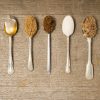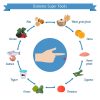The Right Diet for Diabetes
Whether it’s to reduce the risk of diabetes or to stay healthy with diabetes, the diet of a person plays a critical role. Carbohydrates get digested to sugar or glucose and enter the blood stream, thus becoming a primary source of energy for body cells, particularly brain and muscles. Another chief component, the fat in our food influences the lipid or cholesterol levels and further impacts body weight, heart disease, blood pressure, etc.
The importance of diet for a person with diabetes is not only limited to carbohydrates or fats, but extends to fiber, vitamins, minerals, antioxidants, etc. A balanced diabetic diet is having right amount of food which meets your body’s nutritional demands. The plate method gives you an ideal diet plan for diabetics which is easy to remember.
In other words, diabetes diet can be categorized into five groups and according to your needs and goals, your dietitian can recommend number of portions of each item that you will need. An example of this method is given below:
| GROUP | RECOMMENDED PORTIONS PER DAY | WHAT’S A PORTION? | SOME EXTRA SUGGESTIONS |
|---|---|---|---|
| Starchy foods | 5-14 |
|
Choose high fiber foods instead of low-fiber varieties |
| Fruits and vegetables | At least 5 |
|
Choose fruits instead of fruit juice |
| Proteins | 2-3 |
|
– |
| Milk and dairy products | 3 |
|
Choose low-fat products |
| Sugars and fats | 0-4 |
|
Less intake is better |
The recommendations in the table are generic, it’s advisable to discuss your ideal diabetic diet plan with a qualified dietitian for the right portions of each food group.
To sustain good health with diabetes, also remember to:
- Maintain a regular meal pattern
- Maintain a food diary to track your food intake. This will help you and your healthcare team map your response to your prescribed diet
- Stick to 3 meals per day with snacks in between to avoid prolonged fasting intervals
- Do not add salt to food and limit the consumption of processed foods
- Include a starchy carbohydrate food such as bread, cereal, potato, rice or pasta (eat the appropriate portion) at each meal
- Do not have too much alcohol
Diabetes and Fruits
It’s a myth that people with diabetes and fruits can’t get along. In fact, it’s recommended that half the diabetic diet plate of each meal be fruits and vegetables.
Fruits are rich sources of vitamins, minerals and antioxidants, and all have different nutritional benefits to offer. The ones rich in simple carbohydrates are called high glycemic index fruits, and these can increase our sugar levels. Remember to consume these in limited quantities. Several fruits do not affect the sugar levels much, so they can be taken in moderate proportions. These are called low glycemic index fruits.
What is the right quantity of fruits for people with diabetes?
1 or 2 portions of fruits for diabetics per day are recommended, although everyone’s personal requirements may differ. You may either be allowed a smaller portion of high glycemic index fruit or a relatively larger portion of low glycemic index fruit.
This should help you understand the quantities of fruits for people with diabetes better:
| FRUIT PORTION SIZE | |
|---|---|
| Low glycemic index | Intermediate/High glycemic index |
| 1 medium sized apple/pear/orange, 2 small fruits e.g. 2 kiwis, 2 mandarins or 2 plums, 1 guava | 4 stewed apricots, a slice of melon or papaya (5 cm), a handful of grapes |
| 1 cup mixed salad | |
As part of your diabetic diet, remember to:
- Eat fruits raw, or as juice with no sugar added, or dried
- Eat whole fruits as they have more fiber and are more filling
- Avoid having more than one portion of fruit at once
- Include whole fruits with your breakfast cereals or as a snack item
At Apollo Sugar, our expert certified dieticians and diabetic counselors counsel and help you with your diet. The diet varies from person to person, depending on the requirements and response of each person. Your diet will be devised according to:
- Your diabetes control
- Your physical activity
- Your diabetes medications
- Other complications that you may have
- Your regional or cultural preferences
If you, your family member or friend have diabetes, insulin or other medicines can sometimes cause lower blood sugar levels. Let our healthcare team help you with how to recognize such episodes and give appropriate immediate care.















